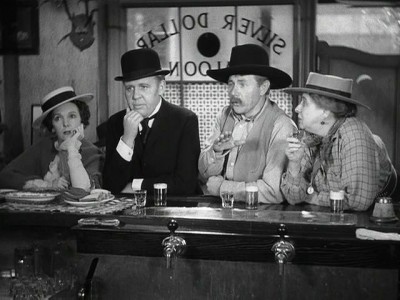
By 1935 Leo McCarey had already been the guiding force between teaming (and developing) Stan Laurel and Oliver Hardy. He had directed classic films with Eddie Cantor, W.C. Fields, the Marx Brothers and Mae West. But he was straining to be able to do something with a little more “seriousness.” (You can sense this in the “Troubled Waters” number in the 1934 Mae West picture Belle of the Nineties.) It came to him in the form of the third — but first talkie — film version of Harry Leon Wilson’s 1915 novel Ruggles of Red Gap. Paramount already owned the rights to the book from their 1923 version, which is perhaps why they afforded McCarey an absolutely top-drawer cast for his film. The resulting film proved to be one of McCarey’s best. Its combination of comedy, sentiment, nostalgia and Americana offered a perfect blend not only for McCarey’s yearning to do something more serious, but it did so in a way that was always charming without becoming gooey or cloying. (Unfortunately, the same cannot always be said of his later films.) While I doubt there are many who would not rate McCarey’s Make Way for Tomorrow (1937) as his absolute best movie, Ruggles of Red Gap shouldn’t be too far behind.

The story concerns Marmaduke Ruggles (Charles Laughton), the very proper and seemingly contented “gentleman’s gentleman” of the Earl of Burnstead (Roland Young), who is residing in Paris. Unfortunately — and just before the film opens — Burnstead got drawn into a game of “drawing poker” with nouveau riche American Egbert Floud (Charlie Ruggles), whose social-climbing wife, Effie (Mary Boland), has taken a shine to the “tone” the presence of Ruggles would bring to their home in Red Gap, Washington — and she thinks he might help to “civilize” Egbert. To make it short, Egbert has “won” Ruggles in the card game and is summarily turned over to the Flouds to return with them to America. Ruggles is not without his misgivings, thinking of America as “a country of slavery” — which Burnstead assures him has been taken care of “by some fellow named Pocahontas or something” — but, being a dutiful servant simple submits to his fate. It’s, of course, quite a different fate than he — or anyone else — expects.

What follows is — to put it simply — one of the most charming and winning films imaginable. The often forced and phony “quaintness” that mars films trading in nostalgia and Americana is nowhere to be found. Everything about the film at least feels genuine, which is perhaps more important than whether or not it is. Scene after scene is funny and endearing. The highlight is probably the scene where American beer hall owner Nell Kenner (Leila Hyams) teaches the visiting Burnstead to play the drums. In fact, this simple scene is quite possibly the most charming moment in…well, just about anything. Even if it stands out, the film is overall so filled with such moments that it would be hard to find fault with any of its 90 minutes.
The Asheville Film Society will screen Ruggles of Red Gap Tuesday, Nov. 6 at 8 p.m. in the Cinema Lounge of The Carolina Asheville and will be hosted by Xpress movie critics Ken Hanke and Justin Souther.




Sold. Just bought it from iTunes.
You could come here and see it for free and with an audience.
I like a definition of ‘free’ that includes a $2200 plane ticket.
I’ll buy you dinner.
Roo stew?
With wombat dressing.